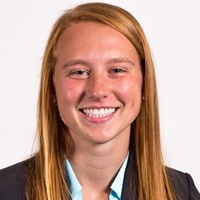Describe some of the steps you took to obtain your internship.
I researched NASA DEVELOP online and found their website and the requirements needed to apply along with the description of the program to determine if it would be a good fit for me. I also networked with people who work at NASA to figure more out about the program.
How far in advance did you prepare?
I started preparing about 4 months in advance before the application was due, but about 6 months before the internship started.
If you used any Career Center services or events to obtain the internship, what were they? How did these help you in landing the internship?
I went to the Career Center to get help on my resume, which helped build the strength of my resume. My resume gained organization and professionalism.
Describe some of your responsibilities or duties during the internship experience.
My responsibilities during the internship were to collaborate with my four other group team members on a project. Our project was called the Appalachian Trail Health and Air Quality project and it was focused on using NASA Earth Observations in order to observe the monthly change in ozone from May to September for the years 2012-2015. My duties included obtaining data from the NASA Aura satellite, specifically from the two sensors: Ozone Monitoring Instrument (OMI) and Microwave Limb Sounder (MLS). I also used this data in ArcGIS to create maps of the monthly ozone along the Appalachian Trail. Along with collaborating with my team members, I also collaborated with our main project partner in Shenandoah National Park. I worked on creating deliverables such as a poster, PowerPoint presentation, technical paper, and an informational video. Lastly, I presented our research at two different closeout events: the Langley Research Center Closeout in Hampton, VA and the NASA Headquarters Closeout located in Washington, DC.
What was a typical day like?
A typical day included abstracting data from satellite sensors and processing this data in ArcGIS. Along with the individual daily work, I often attended meetings with our project partners, science advisors, and team members in order to facilitate the progress of the project.
What are some major takeaways from your experience? How will these help prepare you for the next step after graduation?
In my experience, I have learned how to properly (and cleanly) digest oceanographic samples to analyze for trace metal concentrations. This is a very useful skill in chemical oceanography. I have learned how to create and present a poster in front of an audience. Presenting data is the most important step in scientific research! When/if I start graduate school, I will already have an in-depth understanding of oceanographic concepts, as well as knowledge of helping/guiding younger students.

Emily Beyer
“The Career Center helped me because they prepared me to look professional and feel confident in my skills and knowledge, as well as what I could contribute to the organization that I applied to.”
Major: Biological Sciences, Class of 2017
Internship Experience: NASA DEVELOP, Summer 2016

